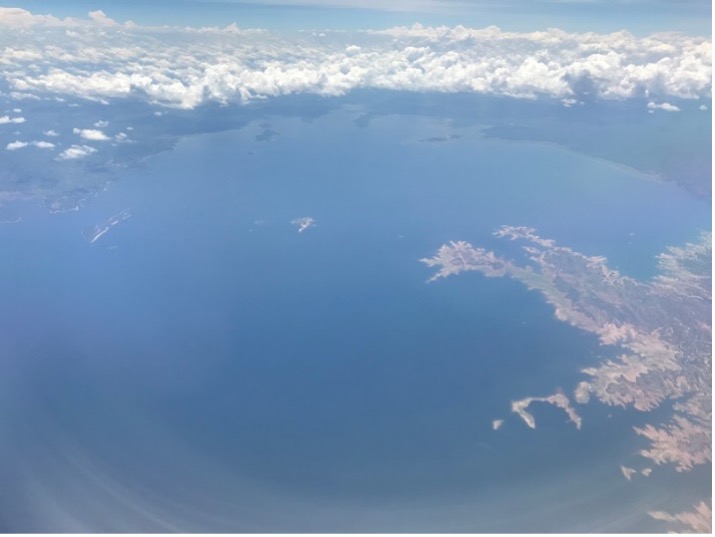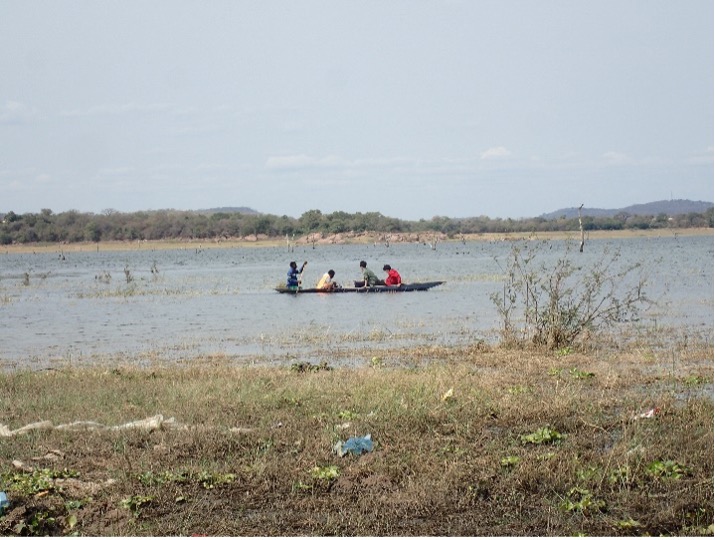Hokkaido University students presented climate research at COP 27
University News | December 22, 2022
Five students from the Environmental Biogeochemistry Lab, Graduate School of Global Food Resources, Hokkaido University, presented their research project at 2022 United Nations Climate Change Conference (COP 27) in Egypt.
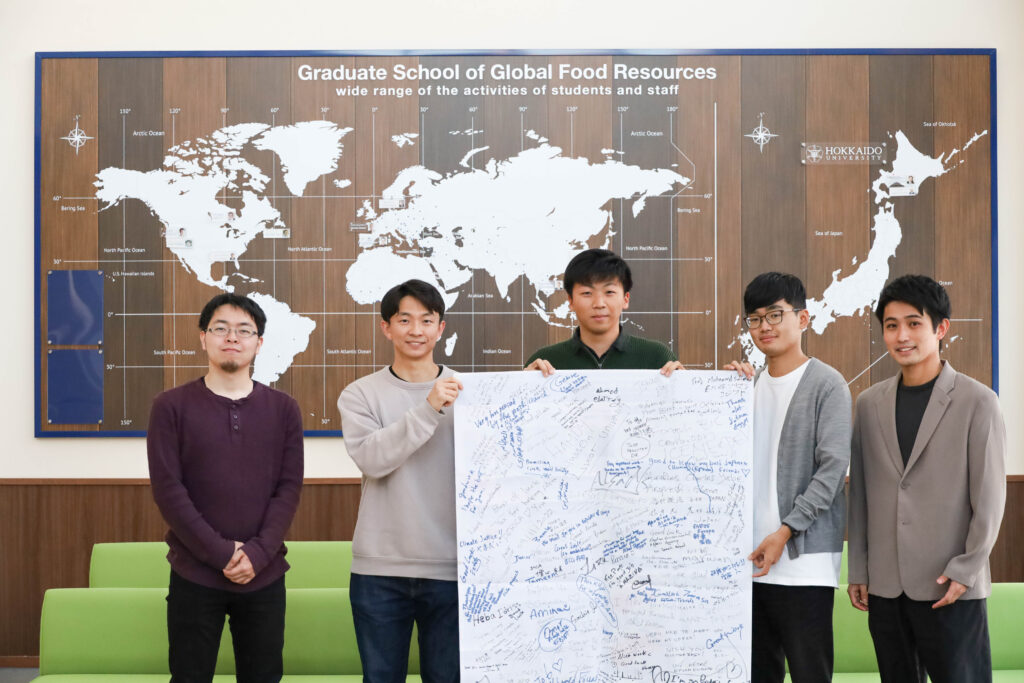
Left to right: Akira Nagata (D1), Yu Hirata (M1), Gen Takahashi (M2), Hiroki Nishimine (M1), and Terumasa Yamamoto (M1). The poster held are filled in with handwritten messages from people who visited their COP 27 booth. (Photo by Miho Nagao)
Water, Energy, Livelihoods and eCOsysteM hEalth (WELCOME) Project is an international and multidisciplinary research project focusing on the improvement of one of the world’s largest artificial lakes, Lake Kariba in Zambia. For its rich natural resource and scenic beauty, Lake Kariba has a pivotal role in the livelihood of the local people; from providing food and irrigation supply to advancing the local tourism.
“It is said that environmental problems occurring in Africa will greatly impact the entire world. So, the issue of coping and adapting to the climate change is a challenge for all of us, regardless of where we live,” Nishimine said describing part of the research backgrounds.
Supported by the local stakeholders, the researchers are assessing the sustainability of Lake Kariba catchment through four main research focus: changes in land use and water quality, ecosystem health, water balance and nutrient cycle, and sustainability and vulnerability. The first two topics already resulted in research reports which were presented in COP 27. The international conference took place in Sharm El Sheikh, Egypt, and was running from November 6th to 18th, 2022.
Through crowdfunding and other supports, the five students representing the project were able to take part in the conference where they set up a booth exhibiting the recent research findings. Fellow researchers, government officials, local students, NGO representatives, hundreds of people coming from different countries and institutes dropped by their booth. All share similar concerns and interests in respect of the research topic.
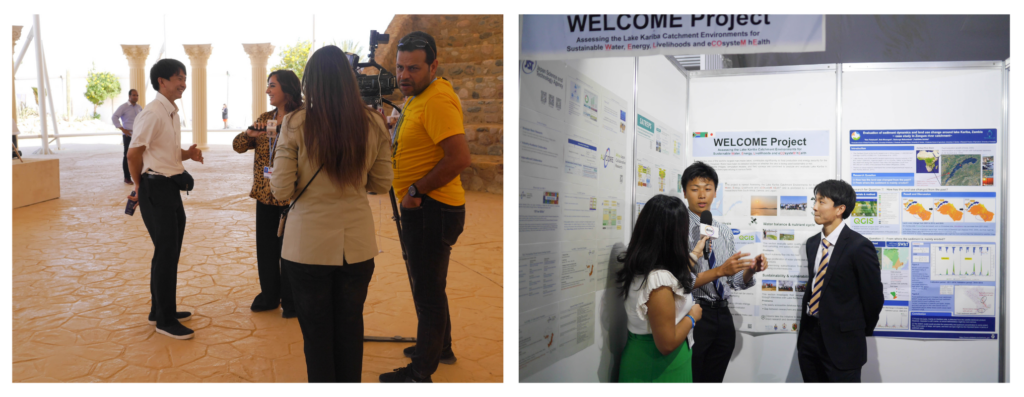
The students had the chance introducing their findings in front of the local TV stations’ and media partners’ cameras. (Photos by Terumasa Yamamoto)
“I think people are interested in this topic especially because the sub-Saharan Africa is an area vulnerable to the effects of the climate change owing to its high population growth,” said Takahashi. “Although the ongoing project officially ends in 2023, through this kind of networking we see some potentials for new projects in future. We met so many people that we amassed around 200 business cards,” added Takahashi with a laugh.
All students agreed that partaking in COP 27 has given an immense amount of experience and new perspectives. “I had always assumed that research is strictly in academic sense, not having any clear image on the application. Only after having met many business and industry-related people in COP 27 I realize that business opportunities can also bloom from research activities,” said Hirata.
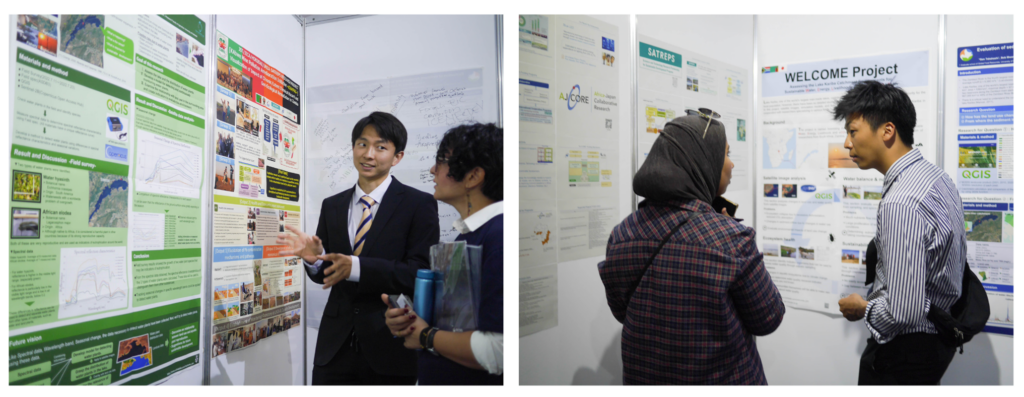
Hirata (left photo, suits) and Takahashi (right photo, striped shirt) using posters to explain their research project to the booth visitors (Photos by Terumasa Yamamoto)
Led by Associate Professor Yoshitaka Uchida of Environmental Biogeochemistry Lab (Graduate School of Global Food Resources), the 3-year research project started in 2021 in collaboration with scientists from Zambia and South Africa. The researchers also presented the results in front of the local communities and stakeholders to receive their opinions and created workshops based on the results.
Uchida is concerned by the fact that, despite facing severe climate-related consequences (e.g., the depletion of water), people in the sub-Saharan Africa do not have a lot of resource to tackle those issues. So, he was pleased with the student’s participation and efforts in the project.
“It is good to see that my students started being aware of these reality through attending COP 27 and by conducting field studies in Zambia with me. I really hope that these future generation can work together with international minds to solve the issue of climate change,” said Uchida.
Written by Aprilia Agatha Gunawan
Related links
WELCOME Project: https://www.uchidalab.com/welcome_pro
Environmental Biogeochemistry Lab’s website: https://www.uchidalab.com/home

